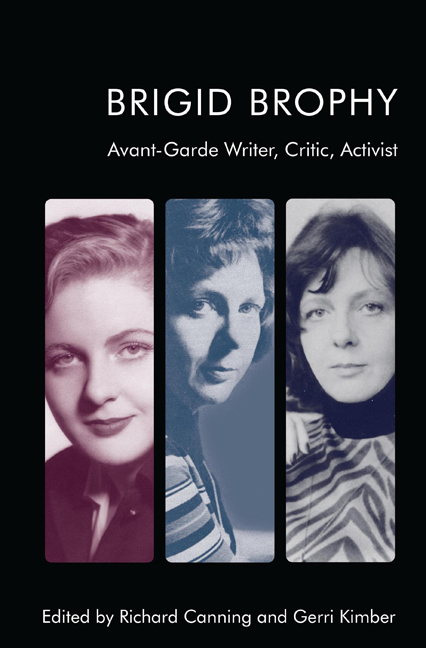Book contents
- Frontmatter
- Contents
- List of Illustrations
- Acknowledgements
- Introduction
- 1 Embodying the Fragments: A Refl ection on the Reluctant Auto-Biography of Brigid Brophy
- 2 Brigid Brophy’s Paradoxical World of Childhood
- 3 Intr oduction to ‘The Librarian and the Novel’
- 4 The Librarian and the Novel: A Writer’s View
- 5 Penetrating (the) Prancing Novelist
- 6 ‘Shavian that she was’
- 7 ‘Il faut que je vive’: Brigid Brophy and Animal Rights
- 8 Brigid Brophy’s Phenomenology of Sex in Flesh and The Snow Ball
- 9 Letter to Brigid
- 10 Encoding Love: Hidden Correspondence in the Fiction of Brigid Brophy and Iris Murdoch
- 11 ‘Heads and Boxes’: A Prop Art Exhibition Collaboration by Brigid Brophy and Maureen Duffy
- 12 Prancing Novelist and Black and White: Experiments in Biography
- 13 ‘Mo nster Cupid’: Brophy, Camp and The Snow Ball
- 14 ‘A Felicitous Day for Fish’
- 15 The Dissenting Feminist
- 16 A Certain Detachment?
- Notes on Contributors
- Index
Introduction
Published online by Cambridge University Press: 17 October 2020
- Frontmatter
- Contents
- List of Illustrations
- Acknowledgements
- Introduction
- 1 Embodying the Fragments: A Refl ection on the Reluctant Auto-Biography of Brigid Brophy
- 2 Brigid Brophy’s Paradoxical World of Childhood
- 3 Intr oduction to ‘The Librarian and the Novel’
- 4 The Librarian and the Novel: A Writer’s View
- 5 Penetrating (the) Prancing Novelist
- 6 ‘Shavian that she was’
- 7 ‘Il faut que je vive’: Brigid Brophy and Animal Rights
- 8 Brigid Brophy’s Phenomenology of Sex in Flesh and The Snow Ball
- 9 Letter to Brigid
- 10 Encoding Love: Hidden Correspondence in the Fiction of Brigid Brophy and Iris Murdoch
- 11 ‘Heads and Boxes’: A Prop Art Exhibition Collaboration by Brigid Brophy and Maureen Duffy
- 12 Prancing Novelist and Black and White: Experiments in Biography
- 13 ‘Mo nster Cupid’: Brophy, Camp and The Snow Ball
- 14 ‘A Felicitous Day for Fish’
- 15 The Dissenting Feminist
- 16 A Certain Detachment?
- Notes on Contributors
- Index
Summary
Brigid Brophy (1929–95) was a British – but, by descent, equally Anglo-Irish – novelist, short story writer, dramatist, essayist, critic, artist, poet, polemicist, activist and sometime celebrity. Many of her publications defy generic classification, and so the following summary of her output might be contested. She was the author of (probably) eleven works of fiction, including these eight (or seven?) novels: Hackenfeller's Ape (1953), which concerns the relationship between an ape in London Zoo and a professor observing the animal's mating rituals; The King of a Rainy Country (1956), portraying a set of bohemians in post-war London and Venice; Flesh: a novel (1962), which recounts the erotic tutelage of an inexperienced husband by his wife; The Finishing Touch (1963; rev. edn 1987), set in a girls’ finishing school in France, which amounts to a fully-realised homage to Brophy's novelistic hero Ronald Firbank, while also containing a portrait of the art historian and Soviet spy Anthony Blunt in fictional and cross-gendering guise as the headmistress; The Snow Ball (1964), Brophy's Mozartian novel, whose characters attend a ball dressed as characters from Don Giovanni; In Transit: An Heroi-Cyclic Novel (1969), one of a tiny handful of novels in English to manage to conceal the anatomical sex of their chief protagonist entirely, with the further distinction of deploying that utterly contemporary dystopia the airport lounge as its chief locale; The Adventures of God in his Search for the Black Girl: A Novel and Some Fables (1973), puns on George Bernard Shaw's 1932 parables about religious faith in The Adventures of the Black Girl in Her Search for God; and lastly Palace without Chairs: A Baroque Novel (1978), a playful, Shavian dialogue questioning the nature of democracy, set in an imaginary Middle European kingdom called Evarchia. Brophy's writing career then dramatically and cruelly ended: she was diagnosed with multiple sclerosis in 1983, in her early fifties.
She also wrote shorter fiction: her career began with the story volume The Crown Princess and Other Stories (1953). Brophy's radio play The Waste Disposal Unit was broadcast and published in 1964.
- Type
- Chapter
- Information
- Brigid BrophyAvant-Garde Writer, Critic, Activist, pp. 1 - 9Publisher: Edinburgh University PressPrint publication year: 2020



